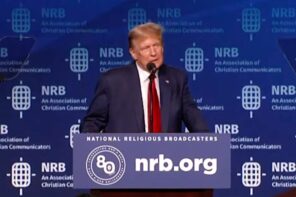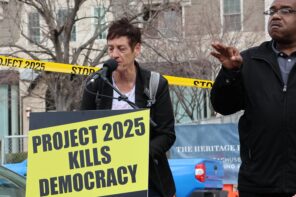OK. I am freaked out that the President may nominate a Catholic to the Supreme Court. I have been wrestling with writing anything about this because it sounds terrible. So, if for one short period of several decades there are six Catholics on the Court, should we care? In the last two rounds of confirmation hearings for Alito and Roberts, conservative Catholics mounted campaigns calling anyone who mentioned religion in the context of nominations anti-Catholic bigots and everyone who had a rational concern about whether or not Catholic nominees would be restricted in their judicial opinions by church demands for orthodoxy on the so called “non negotiable” — gay marriage, abortion, euthanasia, stem cell research and human cloning – went running for cover.
The constitution says there shall be no religious test for public office. It certainly means we would not bar from public office anyone who is of a specific faith or no faith. It also means, and perhaps more pointedly, that we would not appoint someone because they are members of a favored religion. But does it mean we cannot ask the effect that religious beliefs, church positions or church discipline might have on how a nominee would vote on issues before the court?
And given the renewed interest in welcoming religion into public life — whether it be a White House office on faith based issues or increased public funding of religious groups — and increased electoral activity by religious groups on behalf of both Democrats and Republicans, would it not be sensible to treat religion more unexceptionally? We have been told that the public wants to know more about the moral values of policy makers; they want those in public life to speak about their relationship with God. It is now OK to ask whether Jesus would like the budget. If all that is so, why not explore the religious views of nominees for the court – and more importantly, in this age of diversity, why not insist that the Court be religiously diverse?
After all, for the first 180 years the Supreme Court was comprised of nothing but white protestant men. Louis Brandeis, the first Jew was appointed in 1916; Thurgood Marshall, the first African American in 1967 and Sandra Day O’Connor the first woman in 1981. Only eleven Catholics have served on the Court – and five of them are currently serving. The first Catholic justice Roger Taney was also chief justice and issued the infamous Dred Scott decision which declared that African Americans were “of an inferior order and altogether unfit to associate with the white race. The second Edward Douglas White sided with the Supreme Court majority in upholding segregation in 1896.
While being Catholic does not mean being socially conservative (William Brennan was a Catholic justice who strongly favored reproductive rights and faced death threats and demands that he be excommunicated for those views) somehow the current crop of justices tilts right. The five Catholic justices seem to mirror the early prejudices of the court against African Americans in their decisions related to women. It was the five Catholics (Scalia, Kennedy, Thomas, Alito, Roberts) who issued the majority opinion in the Lily Ledbetter case and who have issued the majority opinions related to abortion. In the Ledbetter case and the Carhart (‘partial birth abortion) case, Justice Ginsburg considered their opinions so egregious she read her dissent from the bench. Four of the five Catholic justices reliably vote for the death penalty, with only Justice Kennedy voting against capital punishment, a position not favored by the church but one that is not among the above mentioned “non-negotiables.”
There is a way in which it would be wonderful to have on the Court a progressive Catholic. I get so discouraged each time I see a press report of a five-four decision as most of the time it is a bad decision for social justice and human rights, for personal freedom. And most often the five votes are the Catholic boys. But in the name of religious diversity, it’s time for a non Catholic.




